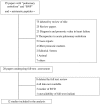Prognostic value of brain natriuretic peptide in acute pulmonary embolism
- PMID: 18721456
- PMCID: PMC2575598
- DOI: 10.1186/cc6996
Prognostic value of brain natriuretic peptide in acute pulmonary embolism
Abstract
Introduction: The relationship between brain natriuretic peptide (BNP) increase in acute pulmonary embolism (PE) and the increase in mortality and morbidity has frequently been suggested in small studies but its global prognostic performance remains largely undefined. We performed a systematic review and meta-analysis of data to examine the prognostic value of elevated BNP for short-term all-cause mortality and serious adverse events.
Methods: The authors reviewed PubMed, BioMed Central, and the Cochrane database and conducted a manual review of article bibliographies. Using a prespecified search strategy, we included a study if it used BNP or N-terminal pro-BNP biomarkers as a diagnostic test in patients with documented PE and if it reported death, the primary endpoint of the meta-analysis, in relation to BNP testing. Studies were excluded if they were performed in patients without certitude of PE or in a subset of patients with cardiogenic shock. Twelve relevant studies involving a total of 868 patients with acute PE at baseline were included in the meta-analysis using a random-effects model.
Results: Elevated BNP levels were significantly associated with short-term all-cause mortality (odds ratio [OR] 6.57, 95% confidence interval [CI] 3.11 to 13.91), with death resulting from PE (OR 6.10, 95% CI 2.58 to 14.25), and with serious adverse events (OR 7.47, 95% CI 4.20 to 13.15). The corresponding positive and negative predictive values for death were 14% (95% CI 11% to 18%) and 99% (95% CI 97% to 100%), respectively.
Conclusion: This meta-analysis indicates that, while elevated BNP levels can help to identify patients with acute PE at high risk of death and adverse outcome events, the high negative predictive value of normal BNP levels is certainly more useful for clinicians to select patients with a likely uneventful follow-up.
Figures




References
-
- Kucher N, Printzen G, Goldhaber SZ. Prognostic role of brain natriuretic peptide in acute pulmonary embolism. Circulation. 2003;107:2545–2547. doi: 10.1161/01.CIR.0000074039.45523.BE. - DOI - PubMed
-
- Pieralli F, Olivotto I, Vanni S, Conti A, Camaiti A, Targioni G, Grifoni S, Berni G. Usefulness of bedside testing for brain natriuretic peptide to identify right ventricular dysfunction and outcome in normotensive patients with acute pulmonary embolism. Am J Cardiol. 2006;97:1386–1390. doi: 10.1016/j.amjcard.2005.11.075. - DOI - PubMed
-
- Tulevski II, ten Wolde M, van Veldhuisen DJ, Mulder JW, Wall EE van der, Büller HR, Mulder BJ. Combined utility of brain natriuretic peptide and cardiac troponin T may improve rapid triage and risk stratification in normotensive patients with pulmonary embolism. Int J Cardiol. 2007;116:161–166. doi: 10.1016/j.ijcard.2006.03.030. - DOI - PubMed
Publication types
MeSH terms
Substances
LinkOut - more resources
Full Text Sources
Other Literature Sources
Medical

